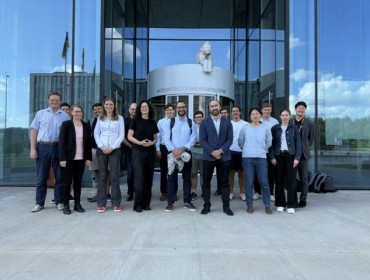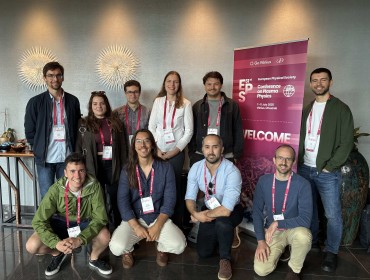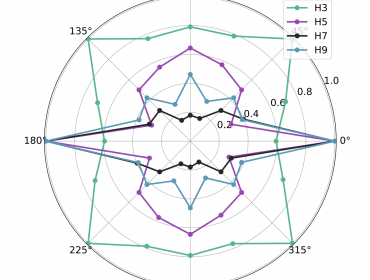-
Quantum Computing Meets Plasma Physics at First European Satellite Meeting
Read moreOn 12 July 2025, Lucas Ivan Iñigo Gamiz, postdoctoral researcher at GoLP, and Efstratios Koukoutsis, postdoctoral researcher at the National Technical University of Athens, chaired the first European Quantum Computing for Plasma Physics Satellite Meeting. The event took place at the Center for Physical Sciences and Technology (FTMC) in Vilnius, Lithuania, immediately following the 51st European Physical Society Conference on Plasma Physics.
The meeting brought together leading researchers from around the world in this rapidly evolving field to present their latest findings and showcase the potential of quantum computing to address computational challenges in plasma physics. The excellent roster of participants included: Prof. Ilon Joseph, Prof. Sauro Succi, Prof. Ilya Dodin, Prof. Yuan Shi, Dr. Erika Ye, Dr. Mažena Mackoit-Sinkevičienė, Mr. Óscar Amaro, Mr. Michael May, and Dr. Hayato Higuchi. The talks featured state-of-the-art quantum algorithms for solving plasma physics and strong-field QED problems, as well as simulations on current quantum hardware and…
July 15, 2025 -
GoLP Members at 51st EPS on Plasma Physics 2025 in Vilnius (Lithuania)
Read moreLast week, a part of GoLP went to Vilnius (Lithuania 🇱🇹) for the 51st EPS Conference on Plasma Physics, chaired by GoLP member Marija Vranic.
In particular, Róbert Babjak, Chiara Badiali and Diogo Carvalho gave invited talks. Lucas Ansia, Óscar Amaro and Pablo Bilbao gave contributed talks. Gareth Williams and Marija Vranic presented posters on their work.
Following, some pictures from the conference.
July 14, 2025 -
Computational Advances Pave the Way for Quantum Vacuum Exploration
Read moreA recent article in Communications Physics by a team of Oxford and GoLP details the development of a novel 3D semi-classical solver designed to simulate quantum vacuum effects. This is a critical step for the design and exploration of experiments that aim to access the quantum vacuum, resorting to the most recent intense laser systems now being developed worldwide.
This work builds on and generalizes the work of GoLP alumnus Rui T and Pedro C and was carried out with the team of Prof. Peter Norreys at Oxford Physics, involving Rui T, Thomas G, and Luis OS from GoLP. The new solver, based on the Heisenberg-Euler Lagrangian, represents a significant step forward by enabling real-time simulations of phenomena such as vacuum birefringence and four-wave mixing. Benchmarked against existing analytical models, the solver demonstrates excellent agreement while providing new insights into the temporal dynamics and spatial characteristics of these interactions….
June 5, 2025 -
GoLP members receive 2025 IST Teaching and Academic Awards
Read moreVarious GoLP members have been awarded by Instituto Superior Técnico in the Day of Técnico 2025 with Teaching and Academic awards. In particular, Thales S, Diogo C, Jorge V, Gonçalo F, Manuel R, and Rafael A have been awarded with a teaching prize. José M, Afonso S, Gonçalo A have been awarded an academic award. Finally, João J has been awarded both a teaching and academic award. Many congratulations to all of them for their amazing work. GoLP team members accounted for 1/5th of the Teaching Awards in the Physics Department.
May 24, 2025 -
Recent paper in Science Advances featured by the Portuguese Science Foundation
Read moreThe Portuguese Science Foundation featured on their website the recent paper in Science Advances by Pablo B et al, highlighting the importance of the computational resources of Deucallion, with statements from Pablo B, Thales S and Luis OS.
May 21, 2025 -
Filipe C awarded a Fulbright Portugal scholarship for UCLA
Read morePhD student Filipe C was awarded one of the Fulbright Portugal 2025/2026 PhD scholarships for research activities in U.S. institutions. This support will allow him to spend 6 months at the Plasma Simulation Group of the University of California, Los Angeles, where he will be collaborating with Prof. Warren Mori to study whether the incoherent properties of light could mitigate the laser-plasma instabilities that compromise Inertial Confinement Fusion.
May 12, 2025 -
Turbulent Relaxation in Collisionless Plasmas Featured on the Cover of PNAS
Read moreIn an article recently featured on the cover of the Proceedings of the National Academy of Sciences (PNAS), a team of researchers from the University of Oxford (Robert J. Ewart, Michael L. Nastac, Alexander A. Schekochihin) and from GoLP/IPFN (Pablo B, Thales S, Luís OS) uncovered how collisionless plasmas relax to equilibrium under the action of turbulence.
While collisional plasmas achieve Maxwellian distributions through particle collisions, the study shows that in collisionless plasmas, turbulent dynamics alone drive relaxation toward universal, but non-Maxwellian, equilibria featuring power-law energy distributions. Theoretical predictions were confirmed through large-scale numerical simulations performed by the GoLP team, which captured the turbulent cascade and the progressive erosion of phase-space conservation over time. These results reveal that turbulence can induce a gradual loss of memory of the plasma’s initial state, leading to the emergence of universal equilibria determined by the nature of the turbulent mixing.
This work advances…
April 30, 2025 -
Paper in Science Advances unveils unique radiation properties of magnetized relativistic plasmas
Read moreIn a recent paper in Science Advances, Pablo B, Thales S, and Luis OS show that radiatively cooled relativistic plasmas can spontaneously emit coherent, polarized radiation via the maser instability. This is a universal feature of relativistically hot plasmas embedded in ultra strong magnetic fields, such as plasmas in the magnetospheres of neutron stars, and should also be observable in laboratory conditions. The paper was also featured in a long story in the national newspaper Publico (.pt) and at the IST website .(.en)
April 27, 2025 -
Mariana M awarded the John Dawson Thesis Prize
Read moreMariana Moreira, a former GoLP member and currently a postdoctoral researcher at CERN working on the AWAKE experiment, has been awarded the prestigious John Dawson Thesis Prize at the Laser-Plasma Accelerators Workshop (LPAW) 2025. The award was presented during the conference, which was held from April 14 to 18 at Hotel Continental in Ischia, Italy.
Mariana carried out her PhD between Instituto Superior Técnico, under the supervision of Jorge Vieira, and CERN under the supervision of Patric Muggli and Bernhard Holzer. Her thesis was recognized for its outstanding contributions to the field of plasma accelerators driven by laser or particle beams. As part of the award, Mariana also gave a short presentation on her work during the conference’s final day.
She is the second GoLP member to receive this distinction, following Marija Vranic, who won the prize in 2017 and is currently an Assistant Professor at IST. Many congratulations to Mariana…
April 24, 2025 -
GoLP members attended LPAW 2025 in Ischia (Italy)
Read moreLast week, a part of GoLP participated in the Laser-Plasma Accelerators Workshop (LPAW 2025), which took place last week in Ischia, Italy, from April 14 to 18.
Carolina A and Chiara B gave invited talks, Rafael A gave a contributed talk in the parallel session on secondary radiation sources and Bhushan T presented a poster summarizing his recent work. Jorge V and Ricardo F also attended the workshop.
April 22, 2025 -
Plasma streaming instabilities constrain dark matter models
Read moreIn a recent Letter in Physical Review D, selected for the Physics newsmagazine of the American Physical Society and as Editor’s Suggestion, a team of researchers of GoLP (Nitin S, now at CINECA, Kevin S, now in Bochum U, and Luis OS), established a new strong bound on dark electromagnetism, the equivalent of electromagnetism to dark mattter. Dark matter and its properties are at the core of some of the most fundamental questions in physics and the present work shows that plasma physics inspired models and simulations can help constrain some of the properties of dark matter.
The simplest model for an electromagnetic-like interaction in the dark sector is equivalent to the electromagnetic interaction between opposite dark charge identical mass particles i.e. dark electromagnetism. Under this hypothesis, dark matter can behave like a cold collisionless plasma of self-interacting dark matter particles, and exhibit plasma-like instabilities with observational consequences.The…
April 17, 2025 -
Aggregation Exam by Marta F
Read moreMarta Fajardo, an IPFN researcher and Associate Professor in the Physics Department at Instituto Superior Técnico, has reached an important milestone in his academic journey by successfully completing her Aggregation in Physics. The two-day examination took place on March 26th and 27th, 2025, at IST.
This achievement highlights Marta’s commitment and significant contributions to physics research.
Congratulations, Marta!
April 10, 2025 -
GoLP Secures Over 80 Million CPU Hours in National Computing Time
Read moreGoLP researchers have been awarded over 80 million CPU hours in national computing time to support three projects exploring some of the most extreme conditions in plasma physics and strong-field QED.
To bolster efforts in strong-field QED, the project Extreme Laser-Particle Acceleration Interactions and Radiation Sources was awarded 21.6 million CPU hours. Led by Lucas I. Iñigo Gamiz, with Marija Vranić as co-PI, the project will investigate novel particle acceleration mechanisms, advanced radiation sources, and strong-field QED effects in laser–particle and particle–particle collisions. A key goal is to develop schemes ready for experiments at upcoming Petawatt-class laser facilities.
In parallel, two new projects further expand GoLP’s growing portfolio in extreme plasma physics.
Fireball Beams, Matter–Antimatter Plasmas @ CERN, coordinated by Luís O. Silva with Thales Silva as co-PI, was awarded 30 million CPU hours to study collective dynamics in relativistic pair plasmas. The project builds on recent experimental breakthroughs at CERN and…
April 10, 2025 -
GoLP Members Present Invited Talks at SPIE Optics + Optoelectronics 2025
Read moreGoLP members Bernardo Barbosa and Thales Silva delivered invited talks at the SPIE Optics + Optoelectronics 2025 meeting in Prague. Bernardo presented on the generation of polarized electron-positron beams in laser-beam interactions, while Thales discussed the generation of unstable plasmas for the electron cyclotron maser and betatron cooling in plasma accelerators.
April 10, 2025 -
Professor Tito Mendonça selected as outstanding referee for APS 2025
Read moreProfessor Tito Mendonça has been selected as an Outstanding Referee by the American Physical Society (APS). This recognition is awarded annually to scientists who have provided exceptional service in the peer-review process across APS journals. The distinction highlights Professor Mendonça’s contributions to maintaining the quality and integrity of published research in physics.
March 11, 2025 -
Aggregation Exam by Jorge Vieira
Read moreJorge Vieira, an IPFN researcher and Associate Professor in the Physics Department at Instituto Superior Técnico, has reached an important milestone in his academic journey by successfully completing his Aggregation in Physics. The two-day examination took place on January 13th and 14th, 2025, at IST.
The exam featured two main components: a Curricular Unit Report on the Introduction to Plasma Physics course and a seminar titled “Plasma-based Accelerators and Light Sources: An Overview from the Past to the Future.” Prof. Luís Lemos Alves led the jury with other distinguished members including Peter Norreys, Caterina Riconda, Brigitte Cros, and Frederico Fiúza.
This achievement highlights Jorge’s commitment and significant contributions to plasma physics, particularly in the field of plasma-based particle accelerators and innovative laser pulses.
Congratulations, Jorge!
January 15, 2025 -
High harmonic generation study published in the journal Optics Express.
Read moreA study of high harmonic generation in materials relevant to power electronics, led by GoLP members, has been published in the journal Optics Express. The work was collaborative between GoLP, ELI-Alps, CTN, and INM Japan. The lead author is Mukhtar Hussein, currently an Associate Researcher at Arizona State University.
January 10, 2025 -
2 million CPU hours in Deucalion awarded to X-GoLP Gareth W
Read moreAs part of the FCT RNCA call for computing time, Gareth Williams was awarded 2 million CPU hours to investigate materials in extreme conditions using Deucalion. This computational time will support his work carried out under his FCT CEEC grant, and model dense quantum plasmas created at VOXEL, and solid density photo ionised plasmas created by X-ray free electron lasers
January 10, 2025 -
VOXEL members at the 20th Radiative Properties of Warm Dense Matter (RPHDM 2024) conference
Read moreMembers of GoLP from the VOXEL team (Lucas Ansia, Gareth Williams and Marta Fajardo) participated in the Radiative Properties of Warm Dense Matter (RPHDM 2024) conference in Paris, which focused on theoretical and experimental advancements in dense plasmas. Key topics included opacity calculations and novel experiments conducted at world-class facilities. Gareth Williams presented experimental results on the role of the shake-off process in the warm dense matter regime, while Lucas Ansia discussed modeling XFEL-solid interactions, highlighting the importance of accounting for non-thermal electron distributions.
November 29, 2024 -
GoLP researchers secure 30 million core hours on MareNostrum 5
Read moreThe project Realistic Simulations of Relativistic Plasmas in Astrophysical and Laboratory Environments, led by GoLP researchers Thales Silva and Pablo Bilbao, has been awarded 30 million CPU core hours on the MareNostrum 5 supercomputer through the Rede Nacional de Computação Avançada. This allocation will support cutting-edge research into the behavior of relativistic plasmas under extreme conditions, with applications to both astrophysical phenomena and laboratory experiments.
Relativistic plasmas, commonly found near compact astrophysical objects such as pulsars and magnetars, play a central role in producing coherent radiation and mediating the interaction of particles with intense magnetic fields. These processes are critical to understanding phenomena like Fast Radio Bursts and pulsar emissions. The awarded resources will also aid in studying similar dynamics in high-intensity laser-plasma experiments, enabling controlled investigations of these extreme conditions in the laboratory.
This project integrates astrophysical theory, computational modeling, and experimental design to address key challenges in plasma physics. By…
November 21, 2024
Group for Lasers and Plasmas > News




























